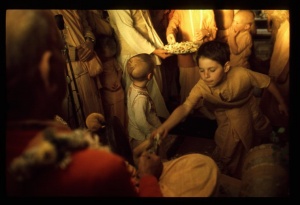SB 1.3.15: Difference between revisions
m (1 revision(s)) |
No edit summary |
||
| Line 1: | Line 1: | ||
{{info | {{info | ||
|speaker= | |speaker=Sūta Gosvāmī | ||
|listener=Sages of | |listener=Sages of Naimiṣāraṇya | ||
}} | }} | ||
[[Category:Srimad-Bhagavatam - Canto 01 Chapter 03]] | |||
[[Category:Bhagavatam Verses Spoken by Suta Gosvami - Vanisource|010315]] | |||
<div style="float:left">'''[[Srimad-Bhagavatam]] - [[SB 1|First Canto]] - [[SB 1.3: Krsna Is the Source of All Incarnations|Chapter 3: Kṛṣṇa Is the Source of All Incarnations]]'''</div> | |||
<div style="float:right">[[File:Go-previous.png|link=SB 1.3.14]] '''[[SB 1.3.14]] - [[SB 1.3.16]]''' [[File:Go-next.png|link=SB 1.3.16]]</div> | |||
{{CompareVersions|SB|1.3.15|SB 1962|SB 1972-77}} | |||
{{RandomImage}} | |||
==== TEXT 15 ==== | ==== TEXT 15 ==== | ||
<div | <div class="verse"> | ||
rūpaṁ sa jagṛhe mātsyaṁ | :rūpaṁ sa jagṛhe mātsyaṁ | ||
cākṣuṣodadhi-samplave | :cākṣuṣodadhi-samplave | ||
nāvy āropya mahī-mayyām | :nāvy āropya mahī-mayyām | ||
apād vaivasvataṁ manum | :apād vaivasvataṁ manum | ||
</div> | </div> | ||
| Line 17: | Line 23: | ||
==== SYNONYMS ==== | ==== SYNONYMS ==== | ||
<div | <div class="synonyms"> | ||
''rūpam''—form; ''saḥ''—He; ''jagṛhe''—accepted; ''mātsyam''—of a fish; ''cākṣuṣa''—Cākṣuṣa; ''udadhi''—water; ''samplave''—inundation; ''nāvi''—on the boat; ''āropya''—keeping on; ''mahī''—the earth; ''mayyām''—drowned in; ''apāt''—protected; ''vaivasvatam''—Vaivasvata; ''manum''—Manu, the father of man. | |||
</div> | </div> | ||
| Line 24: | Line 30: | ||
==== TRANSLATION ==== | ==== TRANSLATION ==== | ||
<div | <div class="translation"> | ||
When there was a complete inundation after the period of the Cākṣuṣa Manu and the whole world was deep within water, the Lord accepted the form of a fish and protected Vaivasvata Manu, keeping him up on a boat. | When there was a complete inundation after the period of the Cākṣuṣa Manu and the whole world was deep within water, the Lord accepted the form of a fish and protected Vaivasvata Manu, keeping him up on a boat. | ||
</div> | </div> | ||
| Line 31: | Line 37: | ||
==== PURPORT ==== | ==== PURPORT ==== | ||
<div | <div class="purport"> | ||
According to Śrīpāda Śrīdhara Svāmī, the original commentator on the Bhāgavatam, there is not always a devastation after the change of every Manu. And yet this inundation after the period of Cākṣuṣa Manu took place in order to show some wonders to Satyavrata. But Śrī Jīva Gosvāmī has given definite proofs from authoritative scriptures (like Viṣṇu-dharmottara, Mārkaṇḍeya Purāṇa, Harivaṁśa, etc.) that there is always a devastation after the end of each and every Manu. Śrīla Viśvanātha Cakravartī has also supported Śrīla Jīva Gosvāmī, and he (Śrī Cakravartī) has also quoted from Bhāgavatāmṛta about this inundation after each Manu. Apart from this, the Lord, in order to show special favor to Satyavrata, a devotee of the Lord, in this particular period, incarnated Himself. | According to Śrīpāda Śrīdhara Svāmī, the original commentator on the ''Bhāgavatam'', there is not always a devastation after the change of every Manu. And yet this inundation after the period of Cākṣuṣa Manu took place in order to show some wonders to Satyavrata. But Śrī Jīva Gosvāmī has given definite proofs from authoritative scriptures (like ''Viṣṇu-dharmottara, Mārkaṇḍeya Purāṇa, Harivaṁśa'', etc.) that there is always a devastation after the end of each and every Manu. Śrīla Viśvanātha Cakravartī has also supported Śrīla Jīva Gosvāmī, and he (Śrī Cakravartī) has also quoted from ''Bhāgavatāmṛta'' about this inundation after each Manu. Apart from this, the Lord, in order to show special favor to Satyavrata, a devotee of the Lord, in this particular period, incarnated Himself. | ||
</div> | </div> | ||
__NOTOC__ | |||
<div style="float:right; clear:both;">[[File:Go-previous.png|link=SB 1.3.14]] '''[[SB 1.3.14]] - [[SB 1.3.16]]''' [[File:Go-next.png|link=SB 1.3.16]]</div> | |||
__NOTOC__ | |||
__NOEDITSECTION__ | |||
Revision as of 13:03, 29 April 2021

A.C. Bhaktivedanta Swami Prabhupada
TEXT 15
- rūpaṁ sa jagṛhe mātsyaṁ
- cākṣuṣodadhi-samplave
- nāvy āropya mahī-mayyām
- apād vaivasvataṁ manum
SYNONYMS
rūpam—form; saḥ—He; jagṛhe—accepted; mātsyam—of a fish; cākṣuṣa—Cākṣuṣa; udadhi—water; samplave—inundation; nāvi—on the boat; āropya—keeping on; mahī—the earth; mayyām—drowned in; apāt—protected; vaivasvatam—Vaivasvata; manum—Manu, the father of man.
TRANSLATION
When there was a complete inundation after the period of the Cākṣuṣa Manu and the whole world was deep within water, the Lord accepted the form of a fish and protected Vaivasvata Manu, keeping him up on a boat.
PURPORT
According to Śrīpāda Śrīdhara Svāmī, the original commentator on the Bhāgavatam, there is not always a devastation after the change of every Manu. And yet this inundation after the period of Cākṣuṣa Manu took place in order to show some wonders to Satyavrata. But Śrī Jīva Gosvāmī has given definite proofs from authoritative scriptures (like Viṣṇu-dharmottara, Mārkaṇḍeya Purāṇa, Harivaṁśa, etc.) that there is always a devastation after the end of each and every Manu. Śrīla Viśvanātha Cakravartī has also supported Śrīla Jīva Gosvāmī, and he (Śrī Cakravartī) has also quoted from Bhāgavatāmṛta about this inundation after each Manu. Apart from this, the Lord, in order to show special favor to Satyavrata, a devotee of the Lord, in this particular period, incarnated Himself.